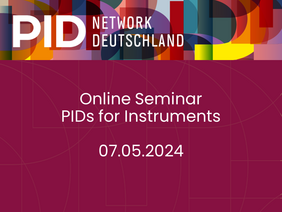Persistent identifiers (PIDs) are an essential component of an open scientific landscape in the digital age, as they make the scientific research process more transparent and networked. The use of state-of-the-art mobile and stationary devices and instruments in research, such as sensors, drones or laboratory instruments, leads to a large amount of digital research data. Research data is already often clearly identified by PIDs, but there is an equally great need for data-generating instruments. This calls for cross-disciplinary, community-supported solutions for the unique and permanent identification of measurement instruments that are actively used in science.
The "PID Network Germany" project hosted the online seminar "PIDs for instruments" on 7 May 2024. A combination of informative presentations on the areas of application and specific examples of PIDs for instruments in the research context as well as concrete discussion impulses offered an exciting exchange for the 90 participants. Metadata, metadata schemas, sensors, large-scale devices and links, networking and much more were discussed. A large number of questions were raised. What requirements should be met and by whom? How can we deal with the existing heterogeneity? How can links be optimized or created? Can there be an overall register for instruments? How should PIDs be created for commercially available devices? Will changes to components be made traceable? The presentation slides are linked in the table below.
The interactive part
Afterwards, there was the opportunity to discuss the application, possibilities and challenges of PIDs for instruments in small groups. Around 30 interested participants took part. Various aspects were discussed in a miro board, including the question of what type of instruments PIDs should be registered for, the benefits of using PIDs for instruments and the requirements for granting or implementing PIDs for instruments.
Advantages of PIDs for instruments: FAIRness, efficiency, recognition
The advantages of PIDs were summarized in the discussion. Participants noted that the use of PIDs helps to make research data FAIR by, among other things, linking metadata and ensuring transparent presentation.
The uniform identification of resources through PIDs makes it possible to efficiently aggregate, harmonize and standardize data. This not only facilitates the reuse of data, but also supports monitoring and cost-benefit analyses.
Another aspect that was emphasized is the possibility of recognising research achievements through the use of PIDs. It was also mentioned that standardized procedures can save time in documentation and make it more efficient and uniform.
A major advantage is that the establishment and use of PIDs is driven by the scientific community and that they can be customized to the needs and requirements of different disciplines. There is a desire for automated, established workflows.
Success factors: cultural change and user-friendliness
The participants also exchanged views on the necessary prerequisites and requirements needed for the introduction and use of PIDs for instruments.
It was noted that a cultural change within the scientific community is required to actually introduce and effectively utilize PIDs. It was also identified that training is needed to support the handling of PID registration and metadata maintenance.
Another important aspect was the need for a user-friendly interface for registering and linking PIDs to facilitate adoption and use. The discussion also addressed the question of how PIDs should be handled for instruments that are not to be published.
In addition, the inclusion of established vocabularies in the metadata schema (PIDinst) was considered crucial.
Challenges: Granularity and versioning
Consideration has been given to how communities can be formed and connected and how the granularity of PIDs should be regulated - whether only an entire device or specific sensors/components should be considered. The granularity of PIDs refers to how detailed or specific a PID should be. This decision is made, among others, by the organisations that manage or provide PIDs, such as research data centers, libraries or data repositories. In addition, the choice of granularity depends on the requirements of the respective application area and the specifications of the scientific community. To ensure effective identification and management of resources, it is important to define granularity with foresight. How to deal with changes to device settings or parts was also discussed. Versioning of research data could be done taking into account the specific use case.
| Time | Talk title | Speaker | Documentation |
|---|---|---|---|
| 13:00-13:05 | Welcome | Steffi Genderjahn | Project slides |
| 13:05-13:30 | The Role of PIDINST in Unique Instrument Identification | Markus Stocker, Technical Information Library (TIB) | https://doi.org/10.5281/zenodo.11145969 |
| B2INST: Registration and identification of instruments | Tibor Kálmán, Gesellschaft für wissenschaftliche Datenverarbeitung mbH Göttingen (GWGD)
| https://doi.org/10.5281/zenodo.11124823 | |
| 13:30-14:10 | Sensor Data Management with O2A at the Alfred Wegener Institute | Roland Koppe, Alfred Wegener Institut (AWI) | https://doi.org/10.5281/zenodo.11468418 |
Persistent Identifiers in the Sensor Management System - Connecting B2INST and the Helmholtz Cloud | Nils Brinckmann, German Research Centre for Geosciences (GFZ) | https://doi.org/10.5281/zenodo.11143440 | |
| Implementation of PIDs for Instruments at HZB | Markus Kubin, Helmholtz Zentrum Berlin (HZB) | https://doi.org/10.5281/zenodo.11122075 | |
| 14:10-14:15 | Break | ||
| 14:15-14:45 | Instrument Metadata: A DataCite Perspective on Registration Practices and Benefits | Sara El-Gebali, DataCite | https://doi.org/10.5281/zenodo.11184733 |
The Synergy of OpenIRIS, Versioning by Git and DOIs/PIDINST for FAIR Data Practices | Sumanghalyah Suntharam, Julia Wermelinger, Federico Grasso Toro, University of Bern | The slides will be published at a later date | |
| ab 14:45 | Interactive part: informal, collegial exchange of experiences in small groups | Miro board | |
| 16:15-16:30 | Wrap Up | Chat documentation | |
Event-DOI: https://doi.org/10.25798/zvca-d585


